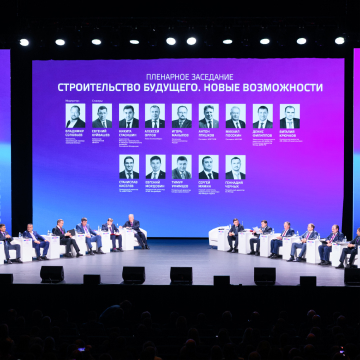A plenary session "Building the Future" was held at 100+ TechnoBuild. New features"

Maintaining the pace and parameters of project financing of housing construction, which has been achieved in the last two years, is currently the most important task, said Nikita Stasishin, Deputy Minister of Construction and Housing of the Russian Federation, at the plenary session "Building the Future. New opportunities" within the framework of the International Construction Forum and the 100+ TechnoBuild exhibition.
The plenary session was held in a question-and-answer format. It was attended by government authorities, representatives of the largest developers and industry associations.
"In modern conditions, the industry faces large-scale challenges that require new approaches and integrated solutions. First of all, it is the preservation of high rates of housing construction and the improvement of social infrastructure. The Sverdlovsk region has all the conditions to fulfill the task set by the President of Russia. So, last year, almost three million square meters of housing were commissioned in the region. The industry is also operating steadily this year," said Evgeny Kuyvashev, Governor of the Sverdlovsk Region, in his welcoming speech.
Answering a question from Stanislav Kiselyov, CEO of Kortros Group, what the construction industry should focus on now, Nikita Stasishin stressed that in addition to increasing the housing commissioning rate to 120 million square meters. By 2027, it is necessary to pay attention to unfinished objects. It is also necessary to increase by 1.5 times the volume of commissioning of facilities that are being built with the participation of budget financing – with the help of infrastructure loans, within the framework of national projects, federal investment programs and others.
In addition, as Stasishin stressed, it is necessary to maintain the pace and parameters of project financing of housing construction, then it will be possible to safely complete everything and start new projects.
"It is important to work very carefully with banks on the current project financing, we must not allow a revision of the rates, a revision of the advance payment limits, a revision of the sampling rhythm," Stasishin stressed.
President of NOSTRA Anton Glushkov drew attention to the need to maintain the number of companies in the construction complex.
"Despite the high pace of construction in the last two years, the number of bankrupt enterprises in the construction industry has not decreased. Therefore, the issue of maintaining the level of economic profitability and the level of pricing in the construction site are very important elements for the construction site to remain as attractive as it has been in the last two years," he explained.
Glushkov also clarified that the industry is successfully coping with the sanctions imposed against Russia, there is no global shortage. Russian companies produce enough products for construction, and there is an import substitution catalog. There is also an active change of ownership of foreign construction companies.
"It's not just a change of ownership, of brands. Everything that is purchased today becomes the property of Russian businesses, and everything that is bought from foreign companies is bought at a serious discount. No business leaves after receiving a full ruble at market valuation. This is important," Stasishin added, adding that this is true for the entire construction business.
Sergey Mamyan, First Deputy General Director of Forum Group, drew attention to the fact that in order to support the construction industry, it is necessary to maintain investments in infrastructure, as well as mortgage subsidies. Stasishin noted that first of all, demand must recover: citizens should start thinking about buying a home.
Timur Ufimtsev, CEO of Sinara Development, agreed that infrastructure development is extremely important for the construction industry, adding that investments in it will begin to "work" in the future in 10 to 15 years. Stasishin clarified that from 2022 to 2025, 370 projects are planned to be implemented in 83 regions.

